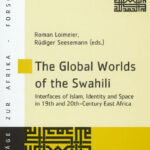Beschreibung
This multidisciplinary volume challenges established ideas about “the world of the
Swahili,” proposing a perspective that highlights the transitory, shifting, and plural
character of East African coastal societies, worldviews, and identities. The contributors
give inside accounts of the broad spectrum of local perceptions of the world in the wider
Swahili context. They demonstrate how these perceptions have been shaped by the
interconnections of the East African coast with other geographical spaces and cultural
spheres (especially Arabia, the Indian Ocean, and Europe). Offering new insights into the
interaction of local culture, Islam, colonialism, the postcolony, and globalization, the
volume shows that the “Swahili” belong to many worlds and continue to cultivate the
interfaces between these worlds.
The present volume is the outcome of several years of collaborative research, academic
meetings, and individual paper presentations coordinated by the editors under the
umbrella of the Collaborative Research Project “Local Agency in Africa in the Context
of Global Influences” based at Bayreuth University (Germany) and funded by the
German Research Foundation (Deutsche Forschungsgemeinschaft). The authors come
from a variety of academic disciplines (Anthropology, History, Religion, Islamic Studies,
and Literature) and throw new light on the multiple worlds of the Swahili.
From 2000 to 2005, the editors, Roman Loimeier (now Centre of Modern Oriental
Studies, CMO, Berlin) and Rüdiger Seesemann (now Northwestern University Evanston),
have formed the core of a sub-project of the Collaborative Research Project “Local
Agency in Africa in the Context of Global Influences” at Bayreuth University,
conducting research on Islamic education in Tanzania and Kenya. Both have a long
record of research and teaching about Islam in sub-Saharan Africa. Loimeier has written
extensively about Sufi orders and Islamic reform movements in Senegal and Nigeria,
examining the relationship between Muslims and the state. Seesemann has previously
worked on Sufi orders, Muslim saints, and Islamism in West Africa and Sudan.


